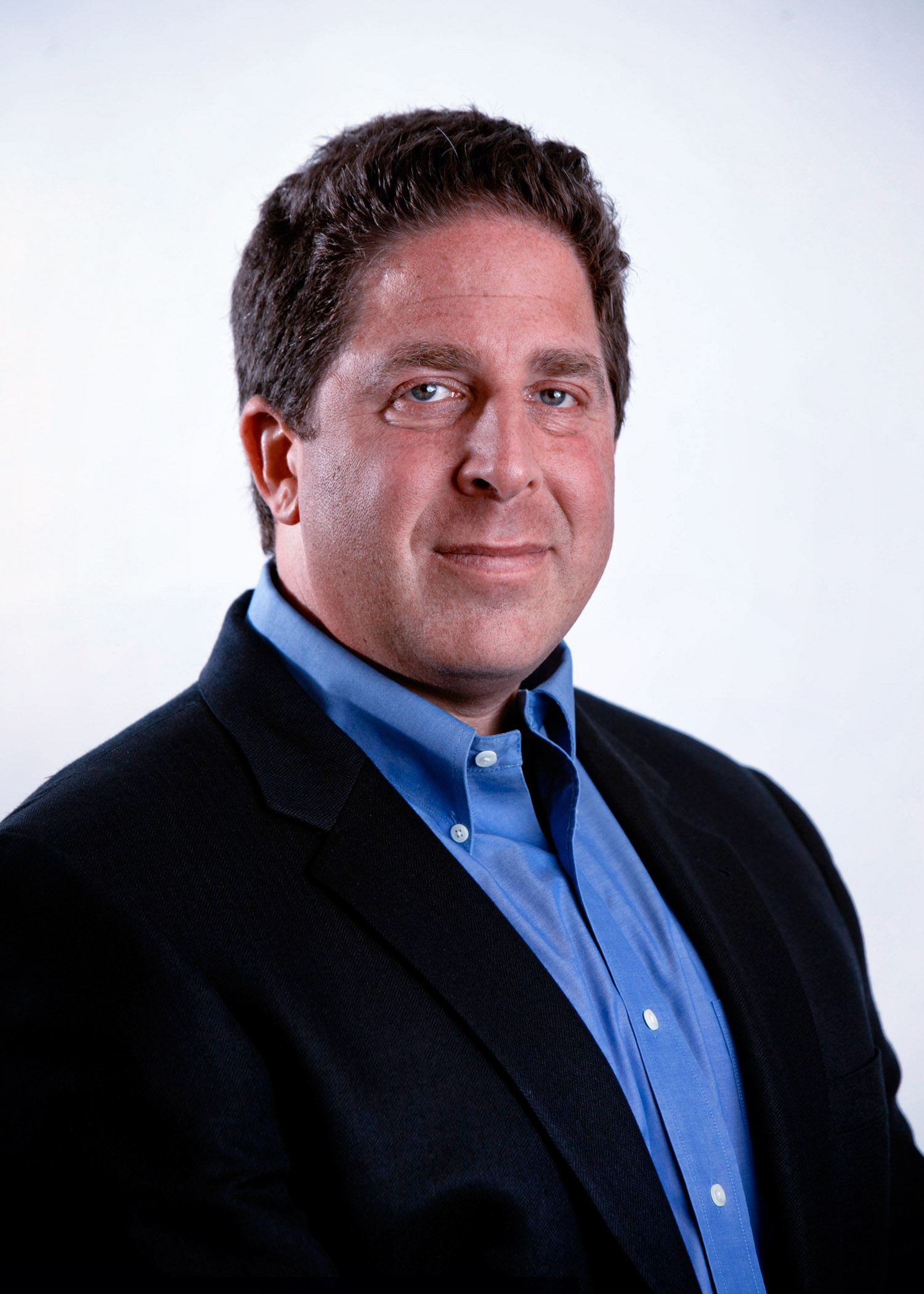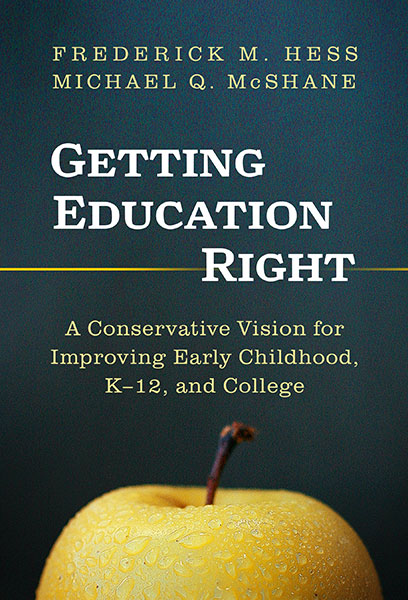By: Frederick M. Hess and Michael Q. McShane

 Frederick M. Hess is a senior fellow and director of education policy studies at the American Enterprise Institute and author of the popular Education Week blog, “Rick Hess Straight Up.” Michael Q. McShane is director of national research at EdChoice and an opinion contributor to Forbes.
Frederick M. Hess is a senior fellow and director of education policy studies at the American Enterprise Institute and author of the popular Education Week blog, “Rick Hess Straight Up.” Michael Q. McShane is director of national research at EdChoice and an opinion contributor to Forbes.
They are the authors of Getting Education Right: A Conservative Vision for Improving Early Childhood, K–12, and College
We just published a new book, Getting Education Right: A Conservative Vision for Improving Early Childhood, K–12, and College. As the title makes clear, we unabashedly make the case for a conservative approach to education. But we think it’s important to clarify the kind of “conservatism” we have in mind.
We’re not talking about politics. We’re not politicos or social media impresarios. We’re educators and scholars. So, when we say “conservative,” we have in mind a set of values and principles that undergird our approach to education. We couldn’t care less how you feel about Trump or Biden. We do care a lot, though, about the wisdom of Edmund Burke and Russell Kirk and the insights of Roger Scruton and Yuval Levin.
Because so much of today’s public discourse is performative, the distinction between principle and politics is frequently lost. That’s especially true in education, where a progressive tilt can make it easy to misconstrue or caricature conservative thought. Given that, it’s useful to address a few frequently-asked questions to be sure we’re clear just what we are (and aren’t) saying. Whether the answers prompt you to check out the book or not, we hope you’ll find this exercise useful.
From the Center: In the book you talk a lot about “shared values.” With the nation as polarized as it’s been in recent years, can we still point to those kinds of shared values?
It’s a funny thing: As divided as we may seem, there’s broad agreement on fundamental values when it comes to schooling. For instance, there’s widespread agreement that hard work, rigor, and respect are good things. Even when it comes to our culture clashes, there’s a lot of common ground. Parents tend to think that the left has a point when it says schools should do a better job teaching America’s complex racial history and that every child should feel welcome in school. And they also agree with the right that schools should reject dogmas that dismiss the importance of hard work or personal responsibility.
Indeed, it’s pretty clear that most Americans reside in both camps—think of it as the “inclusive but sensible” coalition. The American Enterprise Institute’s Survey Center on American Life has found that, among Republicans and Democrats alike, more than four in five adults say social studies textbooks should discuss slave-owning by the Founders, the internment of Japanese Americans during World War II, and the maltreatment of Native Americans, and that students should read “works by a racially diverse set of authors.”
Republicans and Democrats just don’t know each other very well. Democrats don’t think Republicans want to teach students about America’s sins and missteps. Republicans hear the rantings of the leftist fringe and mistakenly think that Democrats don’t want students to learn about the virtues of the Constitution. The amount of actual agreement is obscured by a conflict-fueled online culture, polarizing politics, and the fact that Americans don’t spend enough time talking to those who think differently.
From the Left: In the book, you say that you want parents to have more control over their child’s education. But what if parents are racist, sexist, or transphobic? Why should such parents have the power to direct their child’s education?
In the spirit of good faith, let’s stipulate that the whole question of parental rights can be complex. For instance, there are those on the right who support nearly unfettered educational choice but want to bar parents from using food stamps to buy unhealthy food for their kids. And there are those on the left who oppose letting parents use public funds to choose a school but insist we’ve no business limiting what they choose to buy with publicly funded food stamps.
Given all that, here’s our take: We think parents and guardians generally know their children far better than teachers or administrators do. And we know that parents have those kids for 18 years (or more!) while teachers have them for ten months. That’s why, except in extraordinary cases, we think it’s a mistake to undermine the parent-child relationship. There are, obviously, those unfortunate situations in which home environments are unsafe—but laws already exist to cope with such concerns.
And we’d be remiss if we didn’t point out that it seems like the definitions of terms like “racist,” “sexist,” “homophobic,” and “transphobic” are moving targets. Holding a position on marriage, for example, that President Obama held as recently as 2012 would now be seen as anathema. Just a few years ago, it would not have been controversial to hold that student athletes should compete on teams that correspond to their biological sex, or that we should tightly restrict irreversible, body-altering surgeries for prepubescent children. Today, though, such views have gained prevalence in some education circles, with the result that there are few officials we’d trust to make fair-minded, unbiased determinations about who is transphobic. Indeed, we fear some of our friends on the left are too quick to label as bigots those who don’t immediately and wholeheartedly embrace each new social dogma they propose.
In a big, diverse nation, we’re going to have different views and values. And part of being authentically inclusive is understanding that we will live among and interact with those who think differently about things like morality, civility, and equality.
From the Right: You don’t say much in the book about social and emotional learning (SEL). Wouldn’t you agree that this stuff is a huge threat to our kids and another way for woke extremists to smuggle their agenda into schools?
You’ve got a point. We think there are legitimate concerns that some of what gets billed as SEL is either dreck or ideological nonsense.
At the same time, we think some of the concerns are overblown and that there’s much potential in SEL. After all, it’s tough to succeed in any endeavor—including school—if you can’t manage your emotions, maintain positive relationships, set goals, or make responsible decisions. In a lot of ways, SEL is just a fancy new label for sensible habits that schools traditionally encouraged. Frankly, it’s tough to imagine how this stuff ever got squeezed out of classrooms. Yet it did, especially during the No Child Left Behind and Common Core eras.
Given our mixed feelings, how do we think parents and policymakers should think about SEL? We’ll put it this way: If a principal is sending home notes reporting that teachers are making a sensible effort to promote tolerance, cultivate relationship skills, and encourage better decision-making, that seems to us a very good thing. But if school SEL missives are dotted with talk of microaggressions and implicit bias, parent-teacher night features a pitch for eyebrow-raising disciplinary strategies, or classrooms are cluttered with feeling thermometers and privilege maps, that’s a problem.
So SEL deserves careful scrutiny. At the same time, some critics have turned SEL into an all-purpose bogeyman, accompanied by a whole lot of performative claims on social media. That makes it harder to tackle real problems or distinguish sensible SEL from the troubling stuff, and winds up making it harder to convince educators and the public that the distinction is one worth making. So, skepticism is appropriate, but we’d encourage more focus on particular programs or practices and less on sweeping condemnations of SEL.
We appreciate that many readers will not be satisfied by these answers or that they may have many more questions. Fair enough. If you’re interested in learning more, we’d encourage you to check out the book. And whether you think we make valid points or sound off our rockers, we welcome robust, respectful debate with anyone who’s ready to focus less on politics and more on a principled vision for American education.

Getting Education Right
A Conservative Vision for Improving Early Childhood, K–12, and College
Frederick M. Hess and Michael Q. McShane
Portions of this blog are adapted from Frederick M. Hess and Michael Q. McShane, Getting Education Right: A Conservative Vision for Improving Early Childhood, K–12, and College, New York: Teachers College Press. Copyright © 2024 by Teachers College, Columbia University. All rights reserved.
Photo by RDNE Stock project.
